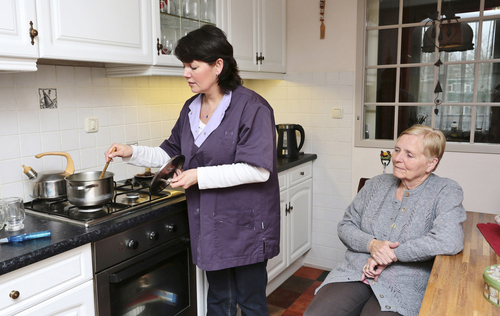
Family caregivers are often created out of necessity. While it may be part of your career path, many at-home caregivers are chosen for their willingness and ability. Yet these aren’t the only qualities a great caregiver needs. From organization skills to a sense of humor, here’s a list of qualities some of the best caregivers in the business have—and they might just be the very qualities that make you so good at your job.
Stay organized to avoid chaos.
Organization is key to keeping track of your life and your family member’s needs. Make a list of phone numbers, including the doctor, dentist, family members, and a backup person (maybe even a neighbor) should you be unavailable. Keep track of appointments for the person you are caring for: doctor and dentist, haircuts, therapy, accountant, dates with friends, etc. Your caregiver duties may include assuring there is lawn or snow removal service.
If you’re responsible for meals and snacks, you may do grocery shopping, meal planning, and food preparation. Consider labeling and organizing these things to ensure you know when you’re out of a favorite food. The more organized you are, the easier it will be to handle all your responsibilities associated with being the caregiver.
Patience is another virtue of caregivers.
One of the goals of the professional or family caregiver is to help the person you are caring for maintain as much independence as possible. It may take them 30 minutes to complete a task you could do in 5 minutes. The temptation is to jump in and take over. Try to provide guidance as necessary but give the person you are caring for the opportunity to complete the task. It’s possible the time it takes them frustrates them as well, and by your staying patient it can help them remain calm, too.
Flexibility is key.
The people you are caring for may have their own way of doing things. Perhaps they prefer to take a shower in the morning when they get up, but today they want to wait until just before they go to bed. Allow them to decide. If you had planned on an outing on Wednesday, and they want to wait till Thursday, be willing to reschedule. While it can be frustrating for you, it encourages your family members to remain independent—which can benefit you when you need time for yourself.
Care from the heart.
Empathy can help you see things through the eyes of the people you are caring for. When you’re in their homes, you’re in their personal territory. Depending on the people, they may or may not even recognize the need for your presence and your help. Your presence in their homes automatically removes some of their independence and all of their privacy.
If there is a level of dementia involved, they may feel confusion, anxiety, or even fear. Understanding the changes that are taking place in their lives can help you better cope with your family members’ moods and struggles.

Laugh often.
Things don’t always go as expected. That’s where a sense of humor can help. “Laughter is the best medicine” is not just an old saying, it’s the truth! Watch a funny show on TV or get out of the house for an adventure. You can even go visit puppies at the local shelter. Telling an unexpected joke over dinner can release a bit of tension. Find opportunities to laugh—for you and your family member.

Keep a positive attitude.
If you approach being a caregiver with a positive attitude, it will show in the reaction of the person you care for. A relationship of trust and mutual respect can develop if you show that you want to be there as a caregiver and friend. There will always be rough patches, but your positive attitude will assure the person you care for that it won’t last forever.
Communicate as a partner.
It’s important to be able to communicate well with the people you care for. Treat it like a partnership, and make sure they understand what your role is in their home. Make them feel comfortable telling you what they want from you—and be sure to share what you need from them.
You may have to be the source of information and observations with their doctors or other family members, ensuring they know what’s going on. You will be the person who spends the most time with these people, and you will need to be able to answer questions regarding their physical, mental, and emotional health in a precise accurate way.
Stay determined.
This last trait may be the most important. You need to be determined to make this work. The objective is to allow these people to remain in their homes for as long as it is feasible. You want them to be safe, comfortable, and happy in their homes. If you are determined to achieve that goal, you will be able to work out any obstacle that comes your way.
Understanding your strengths and your weaknesses can help you be the best at-home caregiver for your family member. Remember, don’t be afraid to ask for help. One person can’t do it all. Enlist friends and family to contribute their time and skills also. Always make sure you have adequate time off from caregiving. You may also want to consider having a professional senior care service help you when you need a break. Keeping you healthy and happy is key to being a great caregiver.
]]>

